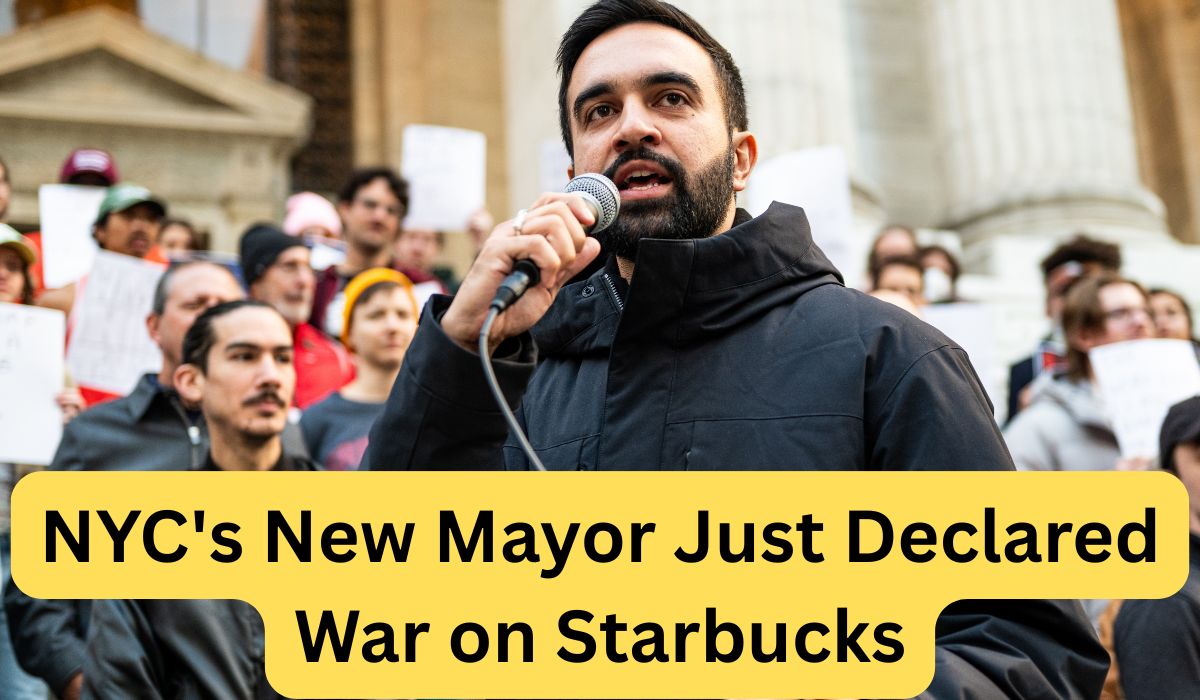New York City’s incoming mayor is making waves before even taking office. Zohran Mamdani, elected November 4th as the city’s next mayor, issued a stark call to action during nationwide Starbucks labor strikes: boycott the coffee chain until workers get a fair contract.
This isn’t subtle political posturing. Mamdani’s message was direct—skip your Starbucks run during the strike and stand with workers demanding real bargaining power. What makes this significant is the timing and the source. As mayor-elect of America’s largest city, Mamdani wields considerable influence over public opinion and corporate behavior. His pro-union stance signals how he’ll use that platform.
The Strike That’s Hitting Starbucks Where It Hurts
Workers walked out in more than 25 cities during one of Starbucks’ most profitable promotional events—Red Cup Day. The timing wasn’t accidental. Union members with Workers United strategically targeted this high-traffic promotion to maximize pressure on the company.
Starbucks maintains nearly all stores remained open with minimal disruption. But that claim doesn’t tell the whole story. Last year’s Red Cup Day strike forced multiple store closures and elevated national awareness of labor disputes at the chain. The company’s defensive response suggests these walkouts create more impact than they’re willing to admit publicly.
The core dispute centers on contract negotiations. Workers United alleges Starbucks refuses to negotiate seriously and continues engaging in anti-union behavior. The company counters that its wages and benefits already make it one of the best retail employers in the nation. Both sides claim the moral high ground, but the facts reveal a more complex situation.
Federal Officials Weigh In
According to federal labor officials, Starbucks has engaged in union-busting tactics. The company denies these allegations, but workers have filed hundreds of unfair labor practice charges. That volume of complaints doesn’t happen in a vacuum—it indicates systematic tensions across the organization.
Negotiations between Starbucks and the union collapsed earlier this year after initial signs of progress. What looked promising months ago has devolved into a standoff with workers taking to picket lines and management digging in on current policies.
The breakdown accelerated under current CEO Brian Niccol. Workers rejected new policies they say strain store staff beyond reasonable limits. Store closures in major cities, including dozens in New York alone, added turmoil for both employees and landlords caught in the crossfire.
Mamdani’s Progressive Mandate
Mamdani’s election represents a seismic shift in New York politics. Running as a Democratic Socialist, he shocked political observers with a June Democratic primary victory that toppled what many considered an entrenched political establishment. His November 4th general election win cemented what his supporters call a mandate for labor-focused policies.
In his victory speech, Mamdani made clear what his administration would prioritize. He stated, “Tonight, against all odds, we have grasped it. The future is in our hands. My friends, we have toppled a political dynasty.” The language wasn’t metaphorical—he’s positioning himself as a fundamental break from traditional New York politics.
What caught attention was how explicitly he framed working-class concerns. Mamdani referenced “fingers bruised from lifting boxes on the warehouse floor” and “palms calloused from delivery bike handlebars,” painting a vivid picture of whose interests he’ll represent. He told the crowd, “This city is your city and this democracy is yours, too.”
He specifically called out the story of Wesley, an 1199 SEIU union organizer who commutes two hours each way from Pennsylvania because New York rent is unaffordable on his salary. That concrete example illustrated the housing crisis his administration will confront.
The Economic Implications
Mamdani’s Starbucks boycott call matters beyond symbolic support for striking workers. It represents how progressive elected officials are willing to use their platforms to pressure corporations on labor practices. If other mayors in major cities follow suit, companies face reputational risk that extends beyond traditional labor disputes.
For Starbucks specifically, the timing is problematic. The company needs to navigate consumer sentiment while maintaining profitability during peak holiday season. Red Cup Day drives significant revenue, and strikes during promotional periods create measurable financial impact even if most stores remain open.
The broader pattern emerging here is the intersection of local politics and national labor movements. Mamdani won his election with support from more than 100,000 volunteers according to his campaign, powered by what he described as “progressive energy” focused on making New York “a city that working people can love and live in again.”
What This Means Going Forward
Mamdani takes office January 1st with clear expectations from his base. His election speech referenced Eugene Debs, the early 20th century socialist leader, signaling his ideological framework. He promised, “We will fight for you because we are you.”
Whether that translates to effective policy remains to be seen, but the political landscape has shifted. Companies operating in New York City should anticipate an administration more willing to challenge corporate practices through both policy and public pressure.
For Starbucks, the immediate question is whether continued strikes and boycott calls will force them back to serious negotiations. Workers United isn’t backing down, and now they have vocal support from New York’s incoming mayor. The company’s claim that it offers industry-leading compensation needs to square with hundreds of unfair labor practice complaints and federal findings of union-busting behavior.
The key question going forward: Can Starbucks afford to maintain its current stance when political winds are shifting toward labor, or will mounting pressure force a different approach to union negotiations? With Mamdani set to take office and other progressive officials watching closely, this labor dispute is becoming a test case for how corporations respond when elected officials publicly back striking workers.
